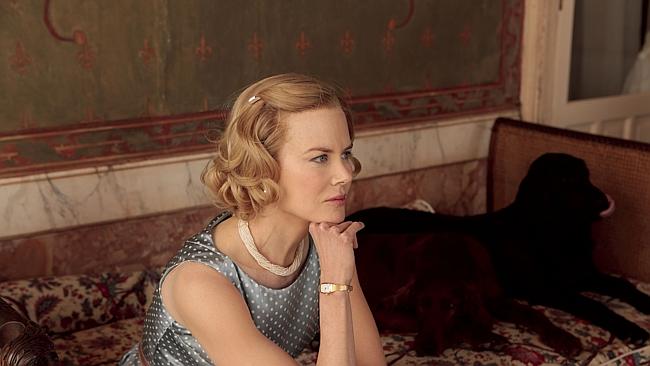Shady place for sunny people
THE fairytale life of Princess Grace of Monaco has been transformed into a glossy soap opera.

FOLLOWING on from The Queen and Diana, Grace of Monaco, the French-Italian co-production that opened the Cannes film festival this month, offers a seemingly irresistible opportunity to experience vicariously the private life of not only a royal personage but also a member of Hollywood royalty. This, of course, is Grace Kelly, who became Princess Grace of Monaco when she married Prince Rainier III in 1956 after encountering him when she starred in To Catch a Thief for Alfred Hitchcock on the French Riviera.
This “fairytale” relationship, as Kelly herself described it, could have made an interesting film on several levels, and although Nicole Kidman doesn’t look at all like Kelly (in contrast to Naomi Watts, who was convincingly recognisable as Princess Diana) the actress is accomplished enough to bring the role to life — that is, when she isn’t saddled with some excruciatingly bad dialogue. Less fortunate is the casting of Tim Roth as Rainier; Roth, too, is a fine actor, but he seems uninterested in the character he is playing here.
THE REALITY OF GRACE KELLY’S FAIRYTALE
No wonder, really, because the fairytale has been transformed, by director Olivier Dahan (who made the Edith Piaf biopic La Vie en Rose) and screenwriter Arash Amel into a glossy soap opera. It might have been interesting to see a fictionalised version of how the glamorous daughter of a Philadelphia millionaire, reportedly with a string of famous lovers left behind in Hollywood, adjusted to her role as princess of the tiny country whose chief claims to fame are a casino and a motor race. No such insights are forthcoming, however, in the film. Instead we get a sort of whodunit in which Grace turns detective to discover the traitor in the palace.
The treachery centres on a 1961-62 diplomatic disagreement with Monaco’s neighbour, France, and its president, Charles de Gaulle. Though the details remain murky for the uninitiated filmgoer, it appears to hinge on taxes that de Gaulle demands the people of Monaco pay to France and Rainier’s refusal to accept this demand. As a result, France cuts the roads leading into the principality and there is even talk of a French invasion.
According to the film, this was all partly triggered by the presence of a Hollywood star in the Grimaldi palace, especially when it was (correctly) rumoured that Grace was considering an offer from her favourite director, Hitchcock, with whom she had made three classic movies, to return to the screen in his projected thriller Marnie (interestingly, Roger Ashton-Griffiths plays Hitch with far more conviction than Anthony Hopkins brought to the role in 2012’s Hitchcock). Bored with life at the palace and tempted by what she sees as a major acting challenge, Grace is eager to accept Hitchcock’s offer, and although Rainier is moderately supportive his concern about the publicity involved comes to a head when the news is prematurely leaked (by the traitor in the palace) and public opinion in Monaco against Grace becomes a political liability.
This may have happened just as it’s presented here, but it doesn’t for a moment convince. With Parker Posey, who plays Grace’s lady-in-waiting and the chief suspect, channelling Judith Anderson as Mrs Danvers in Hitchcock’s Rebecca, the opportunities for melodrama are barely kept in check. Meanwhile Grace has long (boring) conversations with her confessor, an American priest (Frank Langella), Rainier’s sister Antoinette (Geraldine Somerville) glowers, Maria Callas (Paz Vega) sings, Aristotle Onassis (Robert Lindsay) offers advice and Count Fernando (Derek Jacobi) gives Grace a quick course in Monaco etiquette and French accents.
There are moments when all this veers towards the so-bad-it’s-good direction, but it never quite gets there. An opportunity to tell an interesting story about the Hollywood star’s fairytale life has been largely missed, but Kidman’s key speech in the latter stages gives the actress a much-needed opportunity to bring emotion and meaning to her character.
Apart from the opening home movie-like footage taken from a car driving at high speed along a windy mountain road, no reference is made to Kelly’s tragic death in 1982.
Grace of Monaco (PG)
2.5 stars
National release from Thursday




